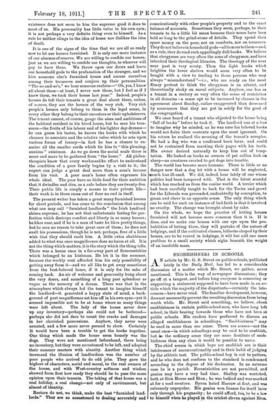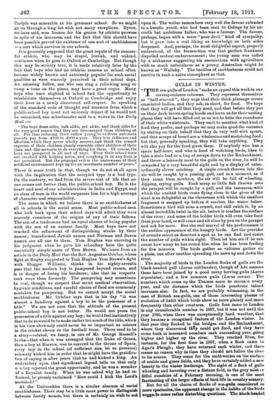SNOBBISHNESS IN SCHOOLS.
AN article by Mr. G. S. Street on public schools,vublisheel lately in the Daily Mail, has led to a considerable discussion of a matter which Mr. Street, we gather, never mentioned. This is the way of newspaper discussions; they go off at a tangent, and before long everyone is censuring or supporting a statement supposed to have been made in an ar- ticle which the majority of the disputants—certainly the late- comers—have never read. The familiar development, however, does not necessarily prevent the resulting discussion from being worth while. Mr. Street said something, we believe, about snobbishness in certain public-school men, who have long left school, in their bearing towards those who have not been at public schools. His readers have preferred to discuss an alleged snobbishness in schoolboys. " Snobbishness " may be used in more than one sense. There are senses—not the usual ones—in which schoolboys may be said to be snobbish, but in the ordinary sense they are more destitute of snob- bishness than any class it would be possible to name.
The chief senses in which boys are snobbish are in their intolerance of unconventionality and in their habit of judging by the athletic test. The public-school boy is cut to pattern, and he who does not conform to the standard is condemned according to the degree of his' declension. In an extreme case he is a pariah. Eccentricities are not permitted, and genius may have a very bad time. Shelley was wretched, both at Sion House and Eton ; he was bullied and was mocked at for a mad creature. Byron bated Harrow at first, and was extremely unpopular. His genius won licence for itself later only through his pugnacity ; he could afford, too, to be a law to-himself when he played in the cricket eleven against Eton.
Carlyle was miserable at his grammar school. So we might go on through a long list with not many exceptions. Byron, we have said, won licence for his genius by athletic prowess in spite of his lameness, and the fact that this should have been possible proved the existence of one sort of snobbishness —a sort which survives in our schools.
It is generally supposed that the great repute of the success- ful athlete, who may be stupid, loutish, and unkind, continues when he goes to Oxford or Cambridge. But though this may be strictly true, it is made relatively false by the fact that boys who had no athletic renown at school often become widely known and extremely popular• for such social qualities as were scarcely perceived in , their school days.
An amusing fellow, one who can sing a rollicking song or vamp a tune on the piano, may have a great vogue. Many boys who were slighted at school find the opportunity to rehabilitate themselves at Oxford or Cambridge and enjoy their lives in a newly discovered self-respect. In speaking
of the standard code of thought and manners from which a public-school boy must not seriously depart if he would not be ostracised, one schoolmaster said to a writer in the Daily Mail :-
" The boys dress alike, talk alike, act alike, and think alike fcr the very good reason that they are discouraged from thinking at all. For thus reducing their callow young to uniform automata parents pay from -tit° to X200 a year. 'They lose influence and affection which they never wholly recqver, and think the reward supreme if their children closely resemble other children of their class and like servants to do everything for them. Of course, the boys are pampered in all sort of ways. Even their school texts are overlaid with helping notes, and roughing it in any form is not permitted. But the principal evil is the narrowness of their artificial environment kept up for an inordinate number of years."
There is some truth in that, though we do not at all agree with the implication that the accepted type is a bad type.
On the contrary, we find from the severe test of life that no one comes out better than the public-school boy. He is the heart and soul of our• administration in India and Egypt, and no class of men in the world surpasses him for a high average of character• and responsibility.
The sense in which we believe there is no snobbishness at all in schools is the social sense. Most public-school men who look hack upon their school days will admit they were scarcely conscious of the origins of any of their fellows. The son of a tradesman had an equal chance of being popular with the son of an ancient family. Most boys have not reached the refinement of distinguishing stocks by their• names ; transformed Jewish names and Norman and Saxon names are all one to them. Tom Hughes was unerring in his judgment when he gave his schoolboy hero the quite essentially simple name of Tom Brown. We learn from an article in the Daily Mail that the Rev. Augustus Or•lebar, whose fight at Rugby suggested to Tom Hughes Tom Brown's fight with Slogger Williams, thinks in his eighty-seventh year that the modern boy is pampered beyond reason, and is in danger of losing his hardness ; also that he respects rank more than formerly. The pampering may sometimes be real, though we suspect that strict medical observation, hygienic conditions, and careful choice of food are commonly mistaken for pampering. But we cannot accept the social snobbishness. Mr•. Orlebar says that in his day "it was almost a handicap against a boy to be the possessor of a title." We are not sure that the attitude of the present public-school boy is not better. He would not press the possession of a title against any boy ; he would feel instinctively that to do so would be to make rather• too much of the title,which in his view obviously could never• be so important as colours in the cricket eleven or the football team. There used to be a story—related, we fancy, in one of Mr. George Russell's books—that when it was arranged that the Duke of Genoa, then a boy at Harrow, was to succeed to the throne of Spain, every boy in the school (of sufficient size, let us presume) solemnly kicked him in order that he might have the gratifica-
tion of saying in after years that he bad kicked a king. An embroidery upon that significant legend tells us that only
o e Loy rejected the great opportunity, and he was a member of a Royalist family. When he was asked why be had re-
frained, be piously exclaimed " How could I kick the Lord's anointed ? "
At the Universities there is a similar absence of social snobbishness. There may be a. little more power to distinguish between family names, but there is certainly no wish to act upon it. The writer remembers very well the favour extended to a bucolic youth who bad been sent to College by his un- couth but ambitious father, who was a farmer. The favour, perhaps, began with a mere " poor devil " kind of sympathy, but it grew into a real liking as knowledge on both sides deepened. And, perhaps, the most delightful aspect, properly understood, of the transaction was that perfect frankness dispelled mutual embarrassment ; the young man was called by a nickname suggesting his associations with agriculture with as much naturalness as a young Australian might be known as " Wallaby." The bacillus of snobbishness could not survive in such a naive atmosphere as that.







































 Previous page
Previous page